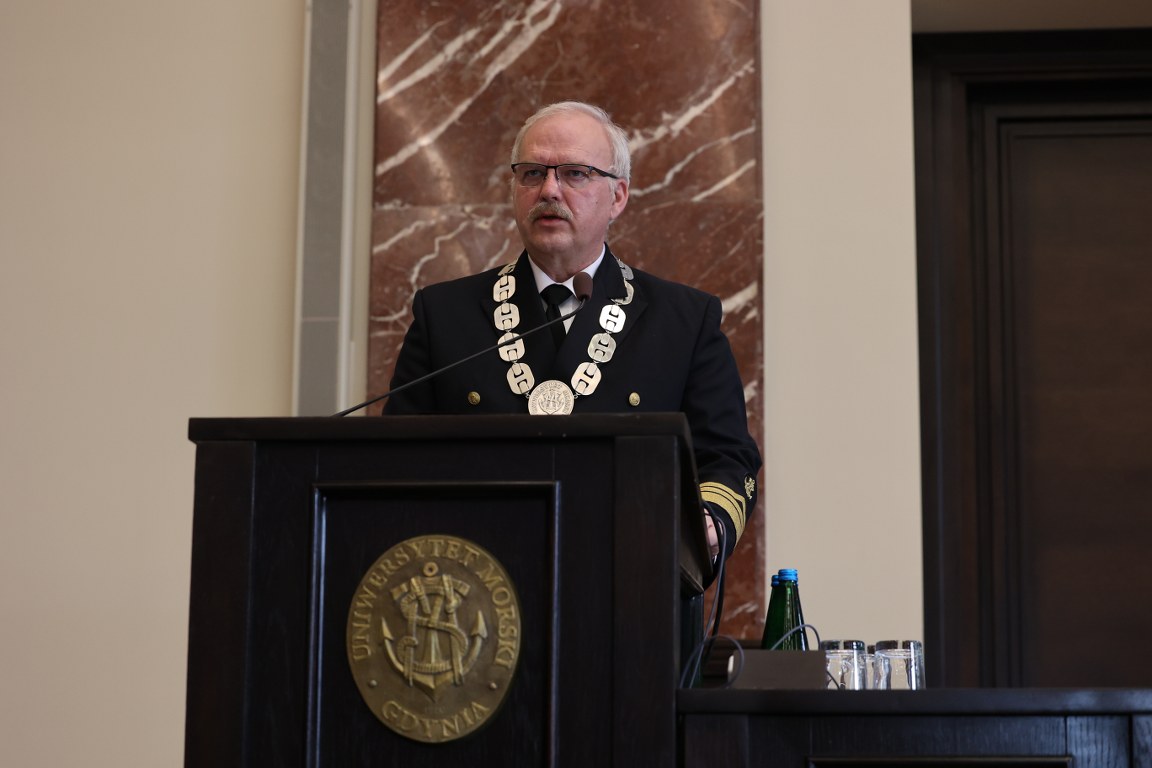Laudation - Professor Krzysztof Czaplewski

Laudation by Professor Krzysztof Czaplewski
on the Occasion of the Conferral of the
Honorary Title of Doctor Honoris Causa
on Professor Bradford Parkinson
Your Magnificence,
Esteemed Senate,
Distinguished Professor,
Ladies and Gentlemen,
I have been given the honor and privilege by the Senate of Gdynia Maritime University to act as the promoter in the procedure for the conferral of the honorary title of Doctor honoris causa on an extraordinary person, known around the world as the Father of GPS—Professor Bradford Parkinson.
The honorary title of Doctor honoris causa is the highest academic honor awarded to the most outstanding individuals, particularly those who have contributed exceptionally to the development of science, culture, and the economy, and whose work has strongly impacted the modern world. The honorary title is given to those who enjoy undisputed authority and unquestionable moral standing. Honorary Doctors are persons who have the potential to change the world around them. Without a shadow of a doubt, one of these exceptional individuals is Professor Bradford Parkinson, a man whose work has had a notable impact on the everyday life of humanity. Just as the spread of steam engines changed the face of the earth in the 19th century, similarly in the second half of the 20th century, the proliferation of computer technology and the launch of satellite systems changed our lives forever. Without satellite systems, our use of computer technology in today’s age of information would be incomplete. Without the personal involvement of Professor Parkinson, modern transportation would not be what it is today. There would be no electronic banking or popular VOD services. Each and every one of us benefits, consciously or unconsciously, from the effects of the work of the Professor and those with whom he has cooperated.
Bradford Parkinson was born on 16 February 1935. He attended Breck Middle School in Golden Valley, Minnesota. In 1957, he graduated with a distinction from the U.S. Naval Academy in Annapolis with a Bachelor of Science Degree in Engineering. His particular engineering interests were noted by one of his professors who recommended he consider being commissioned in the U.S. Air Force (USAF). At the beginning of his USAF career, he completed training in electronics maintenance and oversaw large ground radar installations in Washington State. The Air Force provided the future professor the opportunity to attend Massachusetts Institute of Technology, where he studied Controls Engineering, Inertial Guidance, Astronautics and Electrical Engineering. Upon graduation, he received a Master of Science in Aeronautics and Astronautics. As a USAF officer, he was assigned to work at the Central Inertial Guidance Test Facility at Holloman Air Force Base in Alamogordo, New Mexico, in the role of Chief Analyst for the evaluation of the Air Force’s inertial guidance systems.
In 1964, he began a Ph.D. at Stanford University, graduating in 1966 with a degree in Aeronautics and Astronautics.
Bradford Parkinson’s career in the USAF and beyond is extremely impressive. He served as an academic instructor at the USAF Test Pilot School from 1966 until 1968 and was chief of the Simulation Division. He was also the chief academic instructor to a class of Astronauts. Many of his students went on to work at NASA and flew on the Space Shuttle.
After his time at the Test Pilot School, he was assigned to the Air Force Academy Department of Astronautics and Computer Science, where he worked as a professor and held the role of Deputy Head. He was also involved in the development of a brand-new version of the AC-130 gunship. Later, he deployed to South East Asia during the Vietnam War, where he flew 26 combat missions, for which he was awarded several military honors. Combat experience allowed him to refine the weapons control system. Following his return from deployment, he rejoined the Air Force Academy as the Head of the Department of Astronautics and Computer Science.
In 1973, he was assigned to Project 621B—a code name for a program for the development of a new satellite navigation system. Through his keen dedication, he built a new team of experts, which he headed from 1973 until 1978. The team devised the concept for a satellite navigation system which is available for use 24 hours a day, 365 days a year, developed the system’s architecture, and led to its launch.
Colonel Parkinson was personally responsible for gaining clearance for the development of the system from USAF command and in the U.S. Senate. He also worked on resolving research questions in relation to:
- modification of the CDMA radio signal;
- adaption of the orbit of satellites to reduce the number of satellites at optimal altitude;
- the implementation of atomic clocks into satellite equipment.
In 1978, after 26 years in the military, he retired from the U.S. Air Force at the rank of full colonel.
However, work on the development of GPS continued. In 1979, he worked as a mechanical engineering professor at Colorado State University and later took up the role of Deputy President of the Space System Group at Rockwell International, where he was involved in strategic planning and the development of advanced space systems. During the years 1980-1984, he was the vice president and CEO of the Boston-based software company Intermetrics, which was responsible for the creation of the HAL/S programming language used on the NASA Space Shuttle program. In 1984, he accepted an appointment as a Research Professor at Stanford University where he went on to assume Stanford’s “Edward C. Wells” Chair of Aeronautics and Astronautics, teaching Astrodynamics and Control Theory. In 1999, he became the CEO of Trimble Navigation. He was also the co-principal investigator and program manager on the NASA/Stanford University joint endeavour Gravity Probe B, which was the first ever direct mechanical test of Einstein’s General Relativity. The results were announced and published between 2007 and 2015.
Bradford Parkinson has served on many corporate and governmental boards. For many years, he has been one of the co-chairs of the National Executive Committee for Space-Based Positioning, Navigation and Timing Advisory Board—one of three organisations that oversee the Global Positioning System. In addition, he prepares independent opinions for the U.S. government in relation to its areas of responsibility.
We are honoured to have here with us today a remarkable person who dedicated his entire career to the development of humanity. Unquestionably, one of the most important achievements of Professor Parkinson is the launch of GPS. Another extremely important achievement, however, is the creation of the theoretical foundations and the development of the Wide Area Augmentation System (WASS), mainly used in air transport. The U.S. GPS Satellite Support System increases the accuracy of the determination of the horizontal position by a GPS receiver to 2-3 meters. GPS receivers, assisted by the WAAS system, use corrections when calculating their positions to improve the accuracy of determined positions. The Professor is also the author of other innovations in using satellite systems, such as the blind landing of Boeing 737 aircraft using GPS alone, or the complete automatic control of agricultural tractors using GPS on an uneven field with an accuracy of two inches.
The innovation of his work was confirmed by seven patents obtained during the years 1996-2004.
Professor Parkinson has received many awards and distinctions for his scientific and professional activity. One of the most important awards granted to today’s esteemed Honorary Doctor is the Queen Elizabeth Award. This prestigious honor was given to the entire team responsible for the architecture and development of GPS by the Prince of Wales (now Kind Charles III) in 2019. A year earlier he received the IEEE Medal of Honor.
In the dedication written in a copy of his book “Global Positioning System: Theory and Applications” gifted to me by the Professor, he wrote, “Pioneers are always on top”. Professor Bradford Parkinson is the pioneer who will always be on top and will always be in our memory—his name etched in the marble of our University’s commemorative tablet of honorary doctors.

